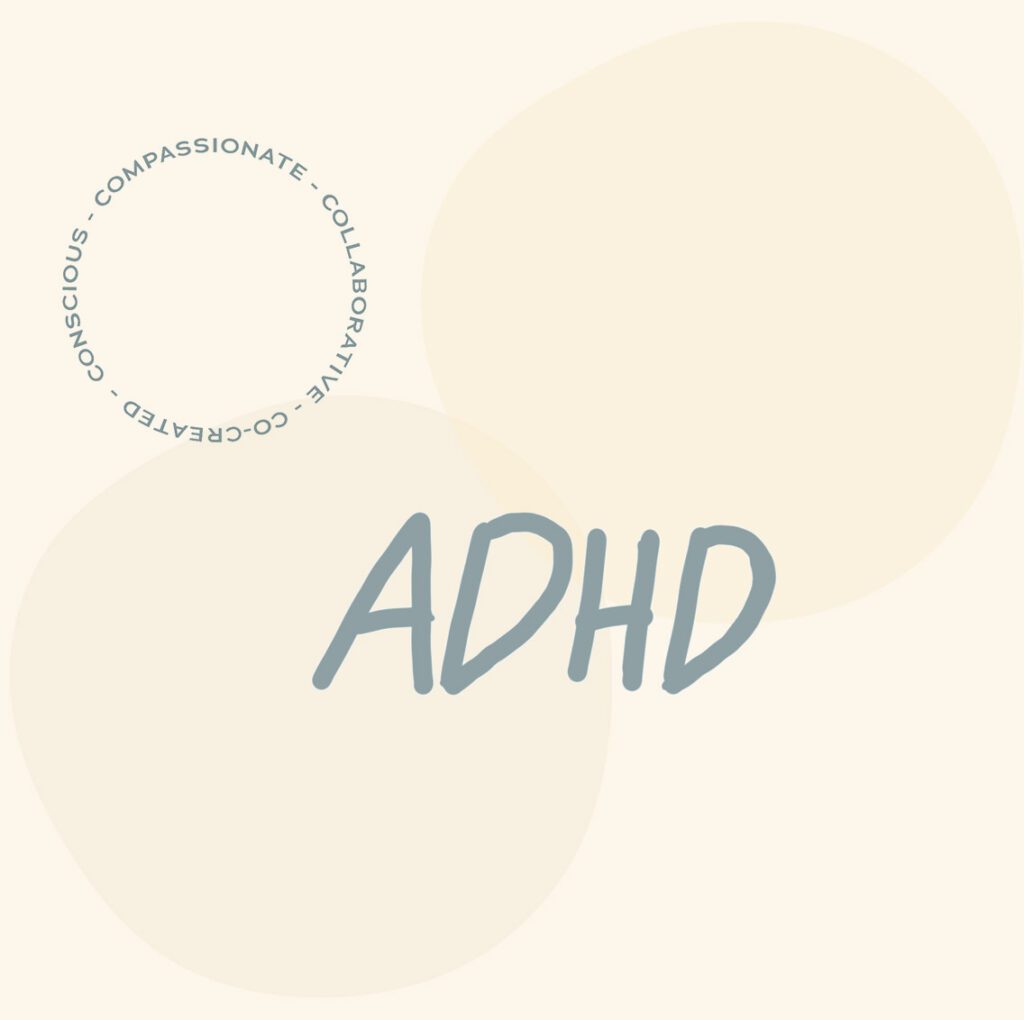
ADHD Therapy
ADHD doesn’t mean that you need to change who you are or how your brain works. Your brain is full of capabilities and strengths.
Because societal and institutional systems are not designed with ADHD people in mind, life can sometimes be frustrating and challenging.
In my work with ADHD folks, my goal is to help you realize your unique abilities and develop strategies and skills that help you work WITH your brain, not against it. In other words, I use a Neurodivergent affirming approach in my practice.
This approach fosters greater self-compassion and compassion for others, while helping you to understand that your brain’s way of working is just part of who you are.
“Self-esteem comes from being able to define the world in your own terms and refusing to abide by the judgments of others.”
– Oprah Winfrey
Finding Balance In Your Life
Therapy can be incredibly beneficial in developing skills for executive functioning and emotional regulation. For executive functioning, therapy provides strategies for time management, organization, task planning, and prioritization, all customized to work with your brain. Emotional regulation skills are also honed through therapeutic techniques that help you to manage anxiety and stress, build emotional resilience, and develop healthy coping mechanisms. Together, these skills help you navigate daily challenges more effectively and enhance your overall well-being.


Therapy can help ADHDers learn new ways of functioning that feel better and are more effective for their personal needs.
What ADHDers Feel
ADHD can often feel like being scattered, with thoughts and tasks constantly swirling in your mind. The struggle with perfectionism, self-criticism, and mood swings can make daily life challenging.
Many ADHD people rely on urgency for motivation, which can lead to frequent burnout. It can be difficult to keep up with or complete tasks and responsibilities by deadlines, leading to feelings of failure and frustration in both personal and professional relationships. You might often feel as though you’re spinning your wheels and getting nowhere, overwhelmed by the sheer weight of planning and scheduling ahead of time.
These experiences are common among ADHDers, and therapy can provide the support and strategies needed to navigate these challenges more effectively.
- You’ve been exposed to messages that money is “good” or “bad” and having it or not having it impacts your value as a person?
- Making big financial decisions feels overwhelming and intimidating?
- You think of yourself as being “bad” with money?
- You feel like money controls parts of your life, rather than you using it as a constructive tool?
How ADHD affirming therapy can help support you
- Enhanced Time Management: Develop personalized strategies to manage time more effectively.
- Better Organization: Learn practical methods to stay organized and keep track of tasks.
- Improved Task Completion: Gain skills to plan, prioritize, and complete tasks efficiently.
- Reduced Anxiety and Stress: Acquire techniques to manage and reduce feelings of anxiety and stress.
- Increased Emotional Resilience: Build emotional strength to handle challenges and setbacks better.
- Healthy Coping Mechanisms: Develop effective ways to cope with difficult emotions and situations.
- Stronger Self-Esteem: Feel better about oneself through understanding and working with one’s brain.
- Greater Self-Compassion: Cultivate kindness towards oneself and accept one’s unique mind.
- Enhanced Compassion for Others: Develop empathy and understanding for others by recognizing your own needs.
- Supportive Relationships: Improve communication and mutual understanding in relationships by educating partners and family about ADHD.
- Unmasking: Allowing yourself to be as you are and not have to pretend your experience and process is different or as someone else may expect you to be.
Emotional Regulation (Managing Feelings)
- Reduced Anxiety and Stress: Acquire techniques to manage and reduce feelings of anxiety and stress.
- Increased Emotional Resilience: Build emotional strength to handle challenges and setbacks better.
- Healthy Coping Mechanisms: Develop effective ways to cope with difficult emotions and situations.
- Stronger Self-Esteem: Feel better about oneself through understanding and working with one's brain.
- Greater Self-Compassion: Cultivate kindness towards oneself and accept one's unique mind.
- Unmasking: Allowing yourself to be as you are and not have to pretend your experience and process is different or as someone else may expect you to be.
Executive Functioning (Organizing)
- Enhanced Time Management: Develop personalized strategies to manage time more effectively.
- Better Organization: Learn practical methods to stay organized and keep track of tasks.
- Improved Task Completion: Gain skills to plan, prioritize, and complete tasks efficiently.
Relationships
- Enhanced Compassion for Others: Develop empathy and understanding for others by recognizing your own needs.
- Supportive Relationships: Improve communication and mutual understanding in relationships by educating partners and family about ADHD.
How ADHD affirming therapy can help support you
Emotional Regulation (Managing Feelings)
- Reduced Anxiety and Stress: Acquire techniques to manage and reduce feelings of anxiety and stress.
- Increased Emotional Resilience: Build emotional strength to handle challenges and setbacks better.
- Healthy Coping Mechanisms: Develop effective ways to cope with difficult emotions and situations.
- Stronger Self-Esteem: Feel better about oneself through understanding and working with one's brain.
- Greater Self-Compassion: Cultivate kindness towards oneself and accept one's unique mind.
- Unmasking: Allowing yourself to be as you are and not have to pretend your experience and process is different or as someone else may expect you to be.
Executive Functioning (Organizing)
- Enhanced Time Management: Develop personalized strategies to manage time more effectively.
- Better Organization: Learn practical methods to stay organized and keep track of tasks.
- Improved Task Completion: Gain skills to plan, prioritize, and complete tasks efficiently.
Relationships
- Enhanced Compassion for Others: Develop empathy and understanding for others by recognizing your own needs.
- Supportive Relationships: Improve communication and mutual understanding in relationships by educating partners and family about ADHD.

“I dwell in possibility.”
– Emily Dickinson

